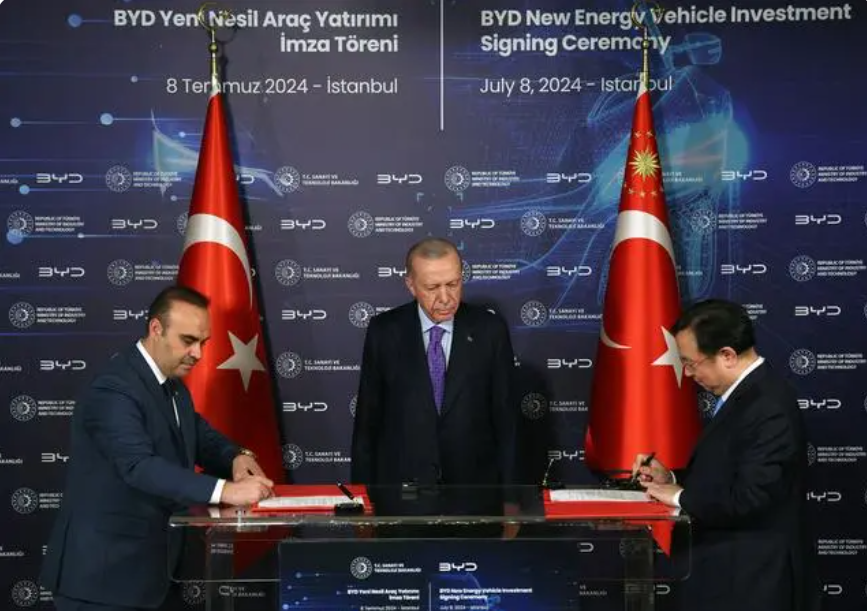News
BYD Investing $1 Billion in Turkey to Build a Car Factory: A New Strategy for Chinese Automakers Entering the EU?
The Anadolu Agency in Turkey reported on a live broadcast of the signing ceremony for Chinese automaker BYD’s investment in building a factory in Turkey. Under the witness of Turkish President Erdogan, BYD Chairman Wang Chuanfu and Turkish Minister of Industry and Technology Caglayan completed the signing. BYD plans to invest $1 billion in Turkey to build a factory with an annual production capacity of 150,000 cars, expected to start operations in 2026.
According to the Turkish newspaper “Economy Daily,” the new factory will produce electric and hybrid vehicles and include a research and development center, providing 5,000 local jobs and boosting the country’s automotive industry. Turkish newspaper “Daily Sabah” analyzes that under the tariff union agreement between Turkey and the EU, Turkish-made cars enjoy preferential conditions for entering the EU market, and BYD’s investment may also benefit from this preferential policy. The Financial Times in the UK reports that this investment shows that Chinese automakers are adjusting their strategy to bypass protectionist measures. The agreement comes as BYD seeks to enter the vast EU market, where tariffs have been imposed on Chinese-made electric vehicles.
According to Reuters, Caglayan said on the 8th that the tariff union agreement between Turkey and the EU may help investors, including BYD, enter the European market. Caglayan also revealed that Turkey is in “intensive negotiations” with other automakers in Europe and Asia regarding investment issues and is currently seeking to attract foreign investment to promote economic reform. In addition, the vice-chairman of the ruling Justice and Development Party in Turkey, Silayci, revealed that GAC Group is negotiating with Turkish new energy vehicle company TOGG on the possibility of establishing a joint venture.
The Nikkei Asian Review reports that Turkey has been trying to protect its domestic car industry. In March 2023, Turkey imposed a 40% import tariff on electric vehicles made in China, in addition to a 10% base tariff. In June, Turkey announced that it would extend this policy to all Chinese imports, including automotive parts. The Turkish Ministry of Trade said the move is aimed at encouraging investment and production in Turkey. The president of the EBS Automotive Consulting Company in Turkey, Sahin, said that Turkey’s government’s move has encouraged BYD to invest in Turkey. Other Chinese electric vehicle brands, such as Chery and Geely, may follow BYD in investing in Turkey.
Shanghai International Studies University Middle East Institute Professor Liu Zhongmin told the Global Times that Chinese automakers investing in Turkey can help alleviate some of the tariff issues they face when exporting to the EU, but the EU’s tariff on Chinese electric vehicles is intended to protect the local car industry. Using Turkey as a bridge to solve export issues to the EU has uncertainties.
“Trade policies of countries are constantly adjusted according to changes in industrial competitive situations. In the future, if Chinese cars export through Turkey to the EU in large quantities, it is hard to say whether the EU will introduce new restrictions,” Northwest University Middle East Institute Professor Huang Minxing told the Global Times.
Peking University Regional and Country Studies Institute Deputy Dean Zhan Tao also told the Global Times that today, the competition around electric vehicles is becoming increasingly fierce, and every move of Chinese companies overseas is closely watched by Western countries. In the future, once the overseas layout of China’s auto industry affects Western interests, their industry protection policies will also be upgraded accordingly. In addition, Turkey previously imposed tariffs on Chinese passenger cars without consulting the public and violated WTO rules, and its trade protectionist practices and policy instability are obvious. Therefore, the development of Chinese automakers in Turkey may be accompanied by many uncertainties, which need to be taken seriously.
Liu Zhongmin told the Global Times that Chinese companies investing in Turkey can also radiate to markets such as the Middle East, the Caucasus, and the Balkans. He believes that Turkey is a hub that can widely radiate to surrounding markets. Therefore, the Chinese company’s market is not necessarily limited to the EU, which is also the strategic value of BYD’s factory in Turkey.
CATEGORIES
LATEST NEWS
CONTACT US
Name: Ms Tina
Mobile:+8613884463677
Tel:+8613884463677
Whatsapp:+8613738490136
Email:[email protected]
Add:Room2104-3, Block A, Ningbo Chamber Of Commerce Building, 558 Tiantong South Road, Shounan Street, Ningbo, Zhejiang, China
